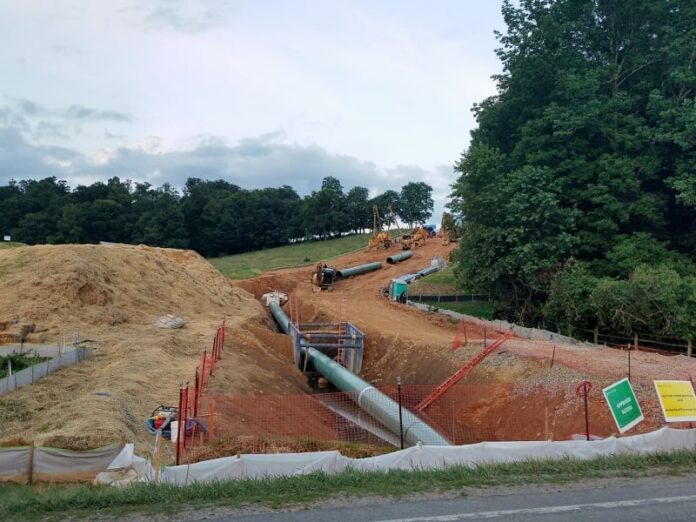
The landmark 2005 U.S. Supreme Court case Kelo v. the City of New London that said eminent domain could be used where private companies want to evict landowners if some public benefit is proven – in this case tax revenues from a proposed drug manufacturing plant – was widely reviled by many as an overreach. They argued that eminent domain – the taking of private property – should be reserved for true public needs, like right of ways for roads, bridges etc.
That Supreme Court ruling led some states to strengthen their eminent domain protections for private landowners. However a clause in Virginia law that allows eminent domain to be used for public utilities was also employed as a legal argument when the Mountain Valley Pipeline ultimately received all of the permitting needed to start cutting down trees and building a high pressure natural gas pipeline that will ultimately make its way to Virginia’s coast.
Some argue that very little of the natural gas in the pipeline is earmarked for use in the state, instead it’s headed overseas, which they declare to be a clear overreach of eminent domain. Supporters of the project say it will provide cleaner, cheaper energy that will help create jobs here in industries that are energy-intensive in their manufacturing operations.
In late June the Blue Ridge Land Conservancy helped sponsor the screening of a film based on the Kelo case, “Little Pink House,” starring Catherine Keener and Jeanne Trippelhorn. It drew an almost full house and afterwards a panel discussion on eminent domain and its relationship to the pipeline followed.
As for the “massive interstate pipelines [like MVP], those weren’t even on the radar screen when the [Virginia law regarding use of eminent domain for utility projects] was passed,” says David Perry, executive director for the Blue Ridge Land Conservancy.

Perry calls the Kelo court battle that went on for years “a heart wrenching tale about the heavy handed use of eminent domain,” and one that ties in to local landowners that feel much the same way about eminent domain being used to acquire right of ways through their mountaintop properties. “They question whether the Mountain Valley Pipeline has any true public benefit.”
The screening of Little Pink House drew applause at points when Susette Kelo – portrayed by Keener, an Academy Award nominee in the past – showed defiance when facing against the City of New London, the State of Connecticut that backed the project and the giant drug maker that was lured to build a plant in the waterfront community where Kelo’s little pink house stood. Ultimately it was torn down – ironically they never built anything where the EMT’s dream cottage once stood – and the plant later closed down.
Among the panelists was Minor Terry, who along with her mother “Red” spent more than a month sitting in trees on their Bent Mountain property, protesting the MVP contractors that were cutting down trees for the pipeline right of way. The Terrys face several misdemeanor charges and their attorney, Justin Lugar, was also a panelist after the screening.
Minor came up from the audience to join the panel, which included Ben Knotts with “Americans for Prosperity.” He shared an eminent domain story from his native West Virginia that uprooted much of a town for another project that did not come to fruition.
Lugar said there are still eminent domain cases “that can go all the way to the Supreme Court. I’m hopeful our cases go the Supreme Court. Some of these are teed up perfectly.” For starters Lugar claims the Federal Energy Regulatory Commission did not have the authority to be involved with invoking eminent domain in the case of the Mountain Valley and Atlantic Coast pipeline projects. “It was unlawful. You’re having takings of private property where there is no public use.”
As for Minor Terry, who spent just one day less tree sitting in protest (33 days) than did her mother: “I was so angry I was shaking [during the Little Pink House screening]. They fought and fought and still lost. The trees have been cut down in my neighborhood and I’m going to do everything in my power to make sure that’s as far as it goes.”
Gene Marrano

